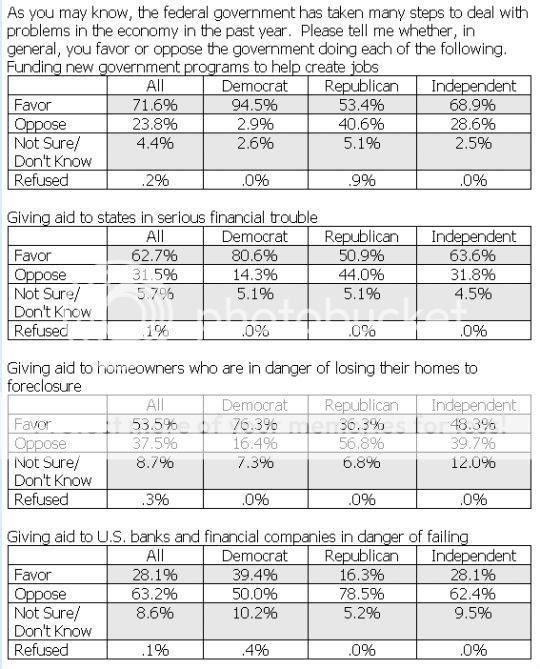Via Paul Rosenberg at Open Left, this table summarizing a recent Winthrop poll:
Seem pretty straightforward. The real irony, of course, is that the general public opposes what the government has done most of, and agrees with what the government has been reluctant to do.
Government by the financial elites, for the financial elites.


Mandos
That entire poll is very interesting if you read the whole thing in context. Take health care: for example, an overwhelming majority of Americans claim to be either satisfied or very satisfied with their health care, a majority think that the cost is reasonable, and so on.
A poll I’d like to see has the same questions as the ones you quote above with two additional variations
(1) Do you want this if it involved higher taxes?
(2) Do you want this if it involved higher taxes on the rich?
Ian Welsh
If you look at various time series, the numbers on health care and other progressive issues have gotten worse over the last 10 months. Significantly so. At this point a majority of the population wants to keep the private system.
Progressivism is being discredited by policies which aren’t even progressive and by Obama’s “leadership”.
C’est la vie.
2010 Dems will probably lose the House.
2012 they will probably lose the Senate and the Presidency.
Fortunately, or unfortunately, Republican policies will be even more disastrous.
Joy.
We’ve got a long way to go before we hit rock bottom, and while there’ll be some bounces along the way, the general path is down, down, down.
Mandos
This is where I don’t know how you can call me the pessimist.
I would not count the Dems in 2010 out, let alone Obama in 2012. I would at this point give them a 60% chance of failure in 2010. The reason why I am hedging is that I got burned in 2008 by predicting that McCain would be able to pull it out because Obama was kind of unimpressive; I was simply looking at the wrong signals, and taking the (surprisingly long) Palin bump as an actual read of voter intentions.
Instead, it turned out that the voters actually wanted what Obama was selling (which I found more than a little “meh” for my tastes), and at the polling booth for their local Congressional candidates, they may still.
Note that the Crazy People (I mean, the wingnuts who are still a little too far from the mainstream to be acceptable in polite Village company) have an increasing hold on Republican nominations, and the Canadian Reform Party Effect may take hold. You may be able to hold a lid on the crazies in a gubernatorial campaign, but when you have candidates running across the country…
So I’m slightly inclined to agree with a negative assessment of the Dems congressional chances in 2010, but only slightly. They will lose seats, that much is practically certain, but enough to lose the majority?
That’s why I say that the whole polling story is very interesting. Americans are not at the point where they feel excessively exposed on the health care front. The politicians will start feeling the heat (for single-payer, etc) only when enough Americans think that they aren’t currently reasonably covered. Clearly, we have not hit that point, so insurance companies way far more in the political calculus.
Mandos
Another way of describing the paradoxes in American polling and electoral politics is to say that it’s a country that seems to poll like Chomsky on the issues and votes like David Broder at the ballot box.
A sort of voter wave/particle duality.
Mandos
D’oh. “weigh far more” at the end of the post two posts back.